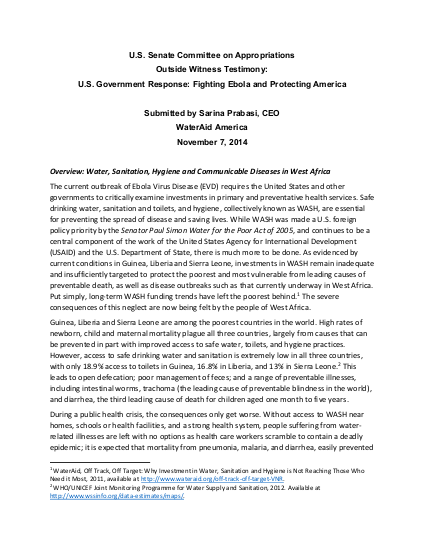Outside Witness Testimony to the U.S. Senate Committee on Appropriations

The current outbreak of Ebola Virus Disease (EVD) requires the United States and other governments to critically examine investments in primary and preventative health services. Safe drinking water, sanitation and toilets, and hygiene, collectively known as WASH, are essential for preventing the spread of disease and saving lives. While WASH was made a U.S. foreign policy priority by the Senator Paul Simon Water for the Poor Act of 2005, and continues to be a central component of the work of the United States Agency for International Development (USAID) and the U.S. Department of State, there is much more to be done. As evidenced by current conditions in Guinea, Liberia and Sierra Leone, investments in WASH remain inadequate and insufficiently targeted to protect the poorest and most vulnerable from leading causes of preventable death, as well as disease outbreaks such as that currently underway in West Africa. Put simply, long-term WASH funding trends have left the poorest behind.1 The severeconsequences of this neglect are now being felt by the people of West Africa
Resource collections
- COVID-19 Response Collection
- Evaluating humanitarian action
- Learning from crises
- UN Habitat - Urban Response Collection
- Urban Response - Urban Crisis Preparedness and Risk Reduction
- Urban Response Collection - Community Engagement and Social Cohesion
- Urban Response Collection - Economic Recovery
- Urban Response Collection - Environment and Climate Change
- Urban Response Collection - Housing, Land and Property
- Urban Response Collection - Urban Crisis Response, Recovery and Reconstruction
- Urban Response Collection - Urban Resilience